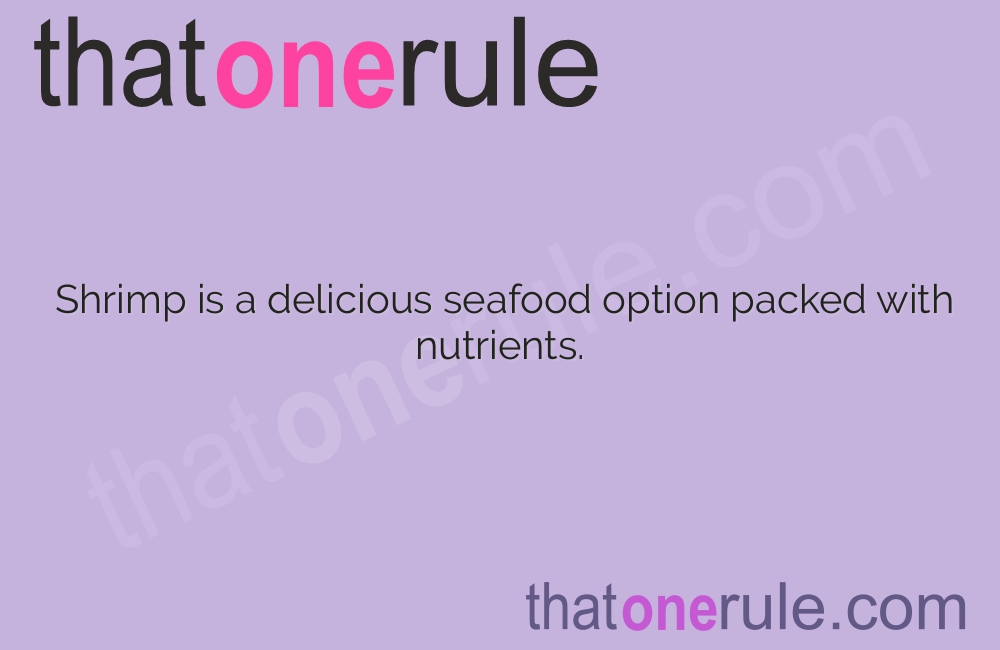Shrimp Nutrition Facts – A Closer Look at 100g Serving Size

Shrimp is a delicious seafood option packed with nutrients.
Did you know that 100g of shrimp contains only 89 calories?
Shrimp is low in fat and carbohydrates, making it a healthy choice for weight-conscious individuals.
Looking for a protein-rich food? Shrimp contains approximately 24g of protein per 100g serving.
Shrimp is an excellent source of omega-3 fatty acids, which are known to promote heart health.
Eating shrimp can enhance brain function due to its high content of vitamin B
7. Shrimp is rich in selenium, a mineral that plays a crucial role in supporting the immune system.
Want to boost your metabolism? Shrimp contains a compound called iodine that helps regulate thyroid function.
Shrimp is a good source of iron, making it an ideal food for preventing iron-deficiency anemia.
Shrimp provides a significant amount of phosphorus, a mineral required for strong bones and teeth.
Watching your cholesterol intake? Good news! Shrimp has relatively low cholesterol levels.
Shrimp contains antioxidants that help protect the body against free radicals and oxidative stress.
Including shrimp in your diet can support healthy skin due to its high content of zinc.
Shrimp is a versatile food that can be enjoyed in various dishes, from stir-fries to pasta.
Grilled shrimp makes a delicious and nutritious addition to any summer barbecue.
Shrimp can be marinated and added to salads for an extra protein boost.
Shrimp Nutrition Facts – A Closer Look at 100g Serving Size part 2
Love spicy food? Shrimp pairs well with chili flakes, providing a flavorful and satisfying meal.
Shrimp can be combined with vegetables and served over rice for a well-balanced meal.
Craving a quick and healthy snack? Steamed shrimp is a guilt-free option.
Shrimp skewers make a great appetizer for parties or gatherings.
Shrimp can be sautéed with garlic and olive oil for a simple yet tasty dish.
Looking for a low-carb alternative to traditional pasta? Try zucchini noodles topped with shrimp.
Shrimp can be added to soups and stews for an extra protein kick.
Shrimp is a popular ingredient in sushi rolls, adding a unique flavor and texture.
Shrimp can be used to create flavorful tacos, topped with fresh salsa and avocado.
Shrimp can be breaded and baked for a healthier version of crispy shrimp.
Shrimp pairs well with citrus fruits such as lemon or lime, creating a refreshing flavor combination.
Love Asian cuisine? Shrimp is commonly featured in delicious stir-fry dishes.
Shrimp can be grilled on skewers with vegetables for a delightful kebab experience.
Want to add a tropical twist to your shrimp dish? Try mixing it with pineapple and coconut for a Caribbean-inspired meal.
Shrimp can be used in sushi rolls or poke bowls for a taste of Japanese cuisine.
Shrimp can be tossed with pasta and a light lemon garlic sauce for a quick and satisfying meal.
Shrimp can be added to quinoa salads for a protein-packed vegetarian option.
Shrimp can be roasted with spices to create a flavorful and satisfying dish.
Shrimp can be added to sandwiches or wraps for a tasty and filling lunch option.
Shrimp can be used in spring rolls, providing a burst of flavor and crunch.
Shrimp can be grilled and served on a bed of greens for a healthy and satisfying salad.
Shrimp can be stuffed with cheese and wrapped in bacon for a decadent appetizer.
Want to add a gourmet touch to your dinner? Serve shrimp on a bed of risotto or creamy polenta.
Shrimp can be added to a creamy pasta sauce for a rich and indulgent meal.
Shrimp can be used in jambalaya, adding a distinctive taste to this traditional Cajun dish.
Craving some comfort food? Shrimp can be added to macaroni and cheese for a tasty twist.
Shrimp can be grilled and served on a bed of quinoa for a healthy and satisfying dinner.
Looking for a Mediterranean-inspired meal? Shrimp pairs well with olives, feta cheese, and tomatoes.
Shrimp can be added to tacos or quesadillas for a flavorful and satisfying Mexican-inspired dish.